- Home
- Madeleine Roux
Tomb of Ancients
Tomb of Ancients Read online
Dedication
For Andrew, Kate, and Iris, who followed this journey to the end.
For my family, friends, and Smidgen.
For A. S. Byatt, whose work deeply influenced this book and all the books to come.
Epigraph
You see what power is—holding someone else’s fear in your hand and showing it to them!
—AMY TAN
Slow but sure moves the might of the gods.
—EURIPIDES
Contents
Cover
Title Page
Dedication
Epigraph
Prologue
Chapter One
Chapter Two
Chapter Three
Chapter Four
Chapter Five
Chapter Six
Chapter Seven
Chapter Eight
Chapter Nine
Chapter Ten
Chapter Eleven
Chapter Twelve
Chapter Thirteen
Chapter Fourteen
Chapter Fifteen
Chapter Sixteen
Chapter Seventeen
Chapter Eighteen
Chapter Nineteen
Chapter Twenty
Chapter Twenty-One
Chapter Twenty-Two
Chapter Twenty-Three
Chapter Twenty-Four
Chapter Twenty-Five
Chapter Twenty-Six
Chapter Twenty-Seven
Chapter Twenty-Eight
Chapter Twenty-Nine
Chapter Thirty
Chapter Thirty-One
Epilogue
Acknowledgments
Image Credits
About the Author
Books by Madeleine Roux
Back Ad
Copyright
About the Publisher
Prologue
It was becoming less and less obvious where I stopped and he began. My father’s dreams had become my own, and like his dark heart, they were ever terrible and troubling. I dreaded sleep yet fell into it with ease, a deep and dreamy slumber consuming me the moment my head touched the pillow. At times, in these dreams, I wandered the past—my past and his—watching as an observer, as an outsider judging my own choices and his.
But on that night, I explored a seemingly endless hall, high and arched as a cathedral, the walls and floor made of a black, twinkling glass. And while there was no explanation for it, I knew this place, and my presence in it, to be real. Though I slid through it in my dream, it felt as solid and true as the bones in my body and the blood in my veins. A real, true place, hidden somewhere, a church of starlight and mystery, with a tremendous secret churning like the determined and bloody chambers of a heart.
When I walked in that hall, I walked with my father’s footsteps, his soul’s presence in my body, his voice never far from my thoughts, as if he were there beside me, smirking, a question on his lips.
Are you lost, child?
I did not feel lost in that dream—in that strange, endless corridor. There was something at the end of the hall waiting for me, an answer, or perhaps an ending. I moved toward it with purpose and a trembling in my hands, for no ending came easily and no answer was ever given without a price.
Chapter One
London
Autumn, 1810
I was not strictly to blame for what happened at the Thrampton ball, though all those who witnessed the aftermath might claim otherwise. It would be hard to argue with their logic, considering I emerged from the house covered head to foot in blood, a small, dull knife still clutched in one hand. For a moment, it had been a sword, at times a shield; it became whatever tool of defense I needed it to be, shifting from honed to blunt at my will, bent by my Changeling powers—now more potent than ever.
For I harbored a god spirit in my body. It had been the thing used to resurrect me, and that was how all this trouble began in the first place. That was how a perfectly charming ballroom became an abattoir, a scene of horror and gore, guts in the punch bowl, screams of anguish splattered across the fine cucumber sandwiches.
I had not attended the Thrampton ball expecting to be ambushed, though there had been signs that something in London was terribly amiss.
The evening of the ball, I looked down at the stoop, littered with dozens of dead spiders, and instinctively reached behind me for the door. There was no mistaking what this meant—somebody with ill intent was watching the house, observing it—and us—closely, and now they were leaving a calling card. Not the polite, sensible sort of card like the one I had left with my long-lost half sister a few weeks prior. No, this was not a kind overture, but a warning. I wondered if it had to do with Mary. When we first arrived in London, she had been using her Dark Fae powers to shield our presence and the house. It was a precaution born of my anxious sense that we would never make a clean getaway from Coldthistle House. Too many dark events had transpired there, and she helpfully agreed to use the lightest shielding she could manage, a sort of mirage that would make us bleed into the neighborhood like a couple of boring, native residents.
But after weeks of all quiet, I had told her the protection was no longer necessary. How wrong I had been.
Toeing aside a few of the dead spiders, I flicked my eyes up to the gated perimeter of the lawn, seeking anything ominous that did not belong. But the fog was thick, and all those who were out late on the town were concealed by heavy black coats or gliding along in carriages, the mist making those carriages look as if they were pulled by nothing at all. By ghosts. I went back inside with heavy steps.
London was not at all what I’d expected.
For all its terror and strangeness, there had been a kind of peace at Coldthistle House. I would wake to near silence or the soft bustle of the staff and guests rousing, and I would sleep to the rumbling snores of Bartholomew the dog, or Poppy’s voice as she sang herself odd lullabies, coaxing us both into dreams.
There was never peace in London, a fact I did not mind, as the traffic of the horses, cries of stray cats, and merry singing of the drunks wandering home at night made for distracting company. The noise kept me from delving too deeply into my thoughts and fears. It kept me from pursuing the growing number of voices in my head, those that had come almost the moment after my friend and former colleague Chijioke diverted my father’s godlike spirit into my body, saving me from death.
Aye, the differences, the changes, did not bother me until the dead things began arriving on my doorstep.
The first had come the week before, a small and dusty bird wrapped in a handkerchief. Mary had been the one to discover it, shrieking as she opened the door to retrieve our wood and fuel delivery. The package had come, but the bird was on top of it, its coal-black legs curled up, its toes splayed horribly, part of the beak missing as if snapped away, a silver spoon impaled through its breast.
The second unwelcome surprise had come only two days later, while we entertained our neighbors, Mr. Kinton and his daughters. We had been enjoying a spirited round of whist, and then there was a knock at the door, and Khent excused himself to help our servant, Agnes, answer. They were gone for too long, prompting me also to take my leave from the game and join them in the front hall. Another strange thing had turned up—this time it was a child’s toy in the shape of a shaggy black dog, its head torn off and left with the body. Khent and I had shared a glance that Agnes couldn’t possibly understand.
I had a feeling we would share it again tonight when I retreated back into the house. But inside I found neither Khent nor Agnes, but Mary, her curling, reddish-brown hair braided neatly up, away from her ears and in a crown over her head. She wore a fine white gown and a green shawl draped over her shoulders. She rushed toward me, reading at once
the pale fury on my face—I had only gone out to get a breath of air, nervous to attend my first social dance in the Ton.
“It’s happened again, hasn’t it?” she asked, her pallor matching mine.
Khent emerged from the shadows near the staircase, dressed for the dance in a becoming black suit and cloaked coat that hid his many tattoos and scars.
“What was it this time?” His low voice trembled with disgust.
“Spiders.” My eyes slid between the two of them, and I walked to the staircase, leaning on the banister. I suddenly felt faint, and the whispering voices in my head rose like a restless tide. “A bird with the spoon, a dead dog, spiders . . . These aren’t random warnings, they’re messages from someone who knows our business here.”
“I shouldn’t have stopped shielding us, it must have been doing some good after all. Perhaps we shouldn’t attend the ball,” Mary said, biting her lip. “We could be in danger.”
“Then we would be safer away from this house,” I suggested. The hall glowed pleasantly with the sconces lit for the evening, a lingering scent of roast and baked bread remaining from our supper. Agnes and our housekeeper, Silvia, chatted in the kitchen, their work done for the day.
“I will fetch a broom,” I added. “The spiders will frighten them.”
“They have a right to know something is amiss,” Mary replied, following me as I went to a small cupboard in the hall pantry. “Someone is trying to frighten you. Us.”
“I know that, and I will tell them, Mary, just . . . in a manner that doesn’t involve them stepping all over a pile of dead spiders.”
I had snapped at her. She recoiled and slipped back toward the foyer, hugging herself tightly with the shawl. It had been happening more lately, my temper fraying, the endless battle to quiet the voices in my head turning me into an exhausted meanie.
“That was unfair, Mary, I apologize. I’m simply upset.” And exhausted. And overwhelmed. I found the broom, carrying it quickly to the door and outside, glancing around again for signs of life on our property as I brushed the tiny black bodies into the hedges.
“As you should be,” Khent grunted. His English had improved so much over our travels and subsequent move to London that he had only a trace of an accent. His penmanship still needed considerable attention, but that was far less of a priority. “From now on I will sleep outside. They will not feel so bold and clever when I catch them red-handed.”
“That’s absurd,” I said, closing the door again and hiding away from the chilly fog. “We can take turns, can we not? Keeping some kind of watch.”
“It almost makes me miss the Residents,” Mary whispered, referring to the shadowy monster creatures that roamed our old home. They had kept a constant vigil, though I had from time to time managed to evade them. “I’m sure Mrs. Haylam would know some magicks to keep us safer—wards or something.”
“We don’t need wards,” Khent replied, taking the broom from me and returning it to the cupboard. “We have . . .” He cleared his throat, checking over his shoulder to make certain Agnes and Silvia were not near enough to overhear. “Me. We have my nose. You’ve been kind enough to let me stay in this house, shelter me. Let me do something in return. Besides, you are . . .”
He was staring at me so intently, it almost made my skin itch. His unusual eyes pulsed with purple light, a side effect of his condition, the ability to shift into a jackal-like giant with razor claws and fangs. Then it dawned on me what he meant—me. My voices. My problem.
“Finish your thought, if you please.”
“You should not take offense, eyachou. You have the voice of a mad god in you; that would test even the strongest Fae.”
Mary took a step back from our bickering, still hugging herself.
“You know I hate it when you call me that.” My temper was causing more of this, too, more fights, more disagreements. It burned to know that both Mary and Khent could see me struggling. I was supposed to be the head of the house, the one who had inherited the fortune that paid for our newer, shinier lives in London, a caretaker and someone to be depended upon. But it was becoming clear that my hidden fight was no longer so hidden.
I pinched the bridge of my nose and took a deep breath, shoving the voices away, trying to bundle them and lock them up tight. But it was like trying to pick up water, and one or two sly whispers always slithered free.
They question you. They dare question you?
The voices, quite obviously, were rarely friendly.
If I wanted my companions to consider me capable, then it was time to act like a leader. I pulled back my shoulders and calmly looked at them each in turn, folding my hands in front of my waist.
“We will attend the ball this evening, so as not to alarm Agnes and Silvia. Tonight, Khent will take the watch on the property, but tomorrow we will discuss a more permanent solution. In the morning, I will let our staff know that something is amiss and question them to see if perhaps they’ve noticed anything strange lately. Mary, maybe you would be so good as to write Chijioke? I’m sure he could either make suggestions of his own or talk to Mrs. Haylam.”
Mary’s eyes lit up at that. I had been surprised when she agreed to stay with me in London and not return to Coldthistle House. She had obviously made the decision with some regret, having discovered a kindling feeling for the groundskeeper of the boarding house. Their frequent correspondence since then had not slipped my notice.
“Diversion then,” Khent said, giving me a toothy smile. “And libations!”
“One or two,” I warned the Egyptian gently. “I shall remind you that this is not one of Seti’s feasts.” Khent had told me all manner of incredible stories about kings and queens whose names were as beautiful as they were unusual. I wondered if even half the tales were true, but he recalled them with such conviction and detail that I decided to believe. And anyway, it felt like a secret between us, these stories of ancient grandeur that he had witnessed firsthand. I was the only person lucky enough to hear these tales, their truth lost to time and, according to Khent, the persistent sandy winds of the desert. I attempted to read Terrasson’s The Life of Sethos with him, but he insisted the inaccuracies were too much to bear.
He snorted and winked, and then held out his arm for me to take. “His parties were tame compared to those of Ramesses. Have I ever told you about the time I ate two scorpions on a dare from His Radiance?”
Taking the proffered arm, I stepped with him out into the misty chill. “I do not think there will be scorpions to swallow at Lady Thrampton’s ball.”
“Vipers?”
“Nary a one,” I said with a laugh. A few spider corpses remained on the stoop, but I tried not to look at them. A cold shiver slid down my spine.
Khent made a face, helping me down the short stairs in my dark crimson silk gown. Mary had been wise to bring a shawl, and now I was wishing for one of my own.
“Are we going to a celebration or a funeral?” Khent groused. “Damned English.”
He would hear no rebuttals from two Irish lasses. We reached the gate at the edge of the lawn, and I grinned up at Khent, who seemed distracted by thoughts of grander, wilder fetes. With his rapidly expanding English vocabulary and friendly demeanor, I sometimes forgot that he had lived a lifetime ago and spent hundreds of years in frozen isolation, imprisoned by my father—by the cruel god now taking up residence in my head.
Turning down the lane toward our destination, he noticed my staring. Mary giggled softly behind us, but I ignored it. There was that shoulder-pinching sensation of being watched as we went, but I ignored that, too, chalking it up to the strangeness of living once more in the city and not in the secluded country fashion.
“What is it?” he asked, smirking. “That look makes me nervous, huatyeh.”
Shrugging, I finally peeled my eyes away. “I’m simply glad you’re free. And here. That we’re all here.”
The thick fog seemed to muffle and swallow our words. That feeling of being watched never left me, a
nd as it persisted, a heavy dread settled over me. I had come so far, all the way to London, and made a new life for myself, one I had perhaps always wanted and dreamed of, but even now I was not safe. Even now, far, far away from Coldthistle House and its dark mysteries, I was hunted.
A group of women in white dresses so bright they cut through the fog huddled on the church steps across the road from us. I had noticed these women before on walks through Mayfair. Recently their numbers had grown, more clusters of white-garbed chanters appearing on street corners, shivering together like sheep on the moors as they braved rain and cold to sing or shout at passersby.
I couldn’t help watching them now as we passed. Perhaps it was the fashionable thing to take a phaeton to the ball, but I preferred to walk and so did my compatriots. Khent craved the darkness and the fresh air on his face. Mary had been confined for a long time, too, and she enjoyed the exercise. Neither of them seemed to pay any mind to the chanters, but I did, squinting into the mist, listening to their shrill voices rise above the steady clip-clop of traffic.
“The shepherd guides you in love! Join the fold, join our flock—the shepherd, you are lost without him! You are lost!” Then they began to sing in unison, a childlike song about the safe embrace of the shepherd.
His arms keep out the wind; he forgives all who sinned . . .
That steel-edged shiver returned and so, too, did one of the voices in my head. I caught eyes with one of the chanters as she raised her voice to boom at us from across the road.
Are you lost, child?
The sound of evening hymns ought to bring comfort, but my stomach squirmed as if filled with snakes. Something was wrong, and either my own instincts or those of the soul in my head felt the danger keenly. I began to walk faster, as if I could outrun the man in my head and the strange women all in white, who watched, vigilant, as we disappeared into the dusk.
Chapter Two
A spider clung to the hem of my gown like a grotesque little bead as we were announced at the ball. I grimaced at it as I made my curtsy, presenting myself to the hosts. It was a tradition I detested, but Khent seemed oddly at home. Perhaps this pomp and grandiosity scratched some long dormant itch from his days among Egyptian royalty. Whatever the case, he swept a bow that did not go unnoticed. Lady Thrampton was a wealthy widow, tall and willowy, with penetrating brown eyes and a narrow chin. She was dressed in a white muslin frock, her necklace studded with fat emeralds. She fanned herself more vigorously as Khent, his black hair smoothed back from his wide forehead, his jaw recently free of the bristly whiskers that had sprouted there like weeds, gave off an eminently courtly style.

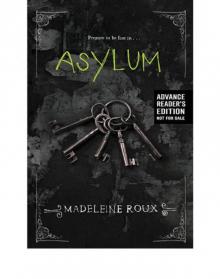 Asylum
Asylum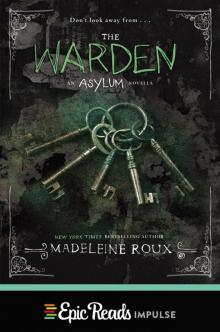 The Warden
The Warden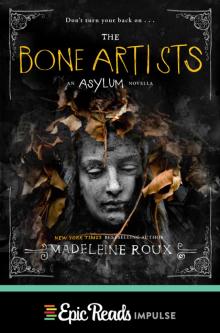 The Bone Artists
The Bone Artists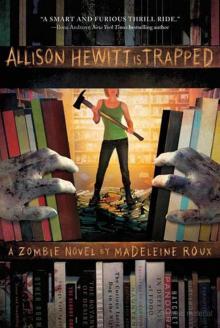 Allison Hewitt Is Trapped
Allison Hewitt Is Trapped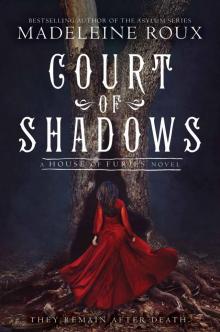 Court of Shadows
Court of Shadows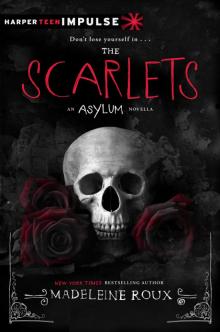 The Scarlets
The Scarlets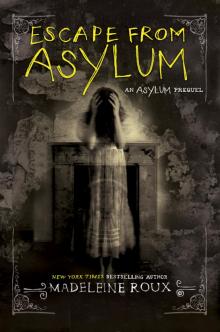 Escape From Asylum
Escape From Asylum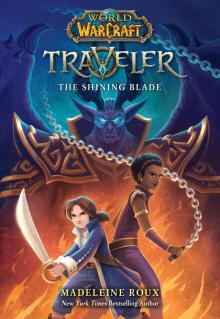 The Shining Blade
The Shining Blade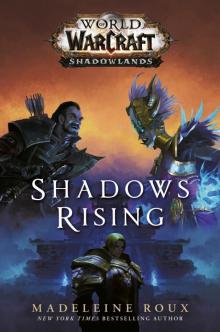 Shadows Rising (World of Warcraft: Shadowlands)
Shadows Rising (World of Warcraft: Shadowlands) Salvaged
Salvaged Sadie Walker Is Stranded
Sadie Walker Is Stranded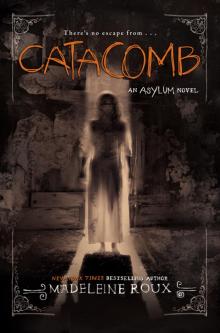 Catacomb
Catacomb Reclaimed
Reclaimed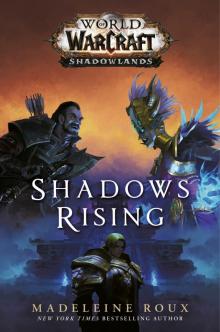 Shadows Rising (World of Warcraft
Shadows Rising (World of Warcraft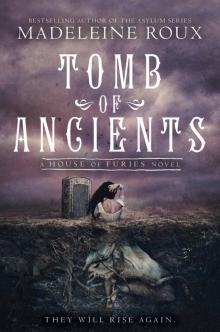 Tomb of Ancients
Tomb of Ancients